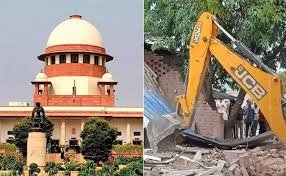Landmark Guidelines to Curb Illegal Property Demolitions by the Supreme Court of India
The Supreme Court of India has issued landmark guidelines aimed at curbing illegal property demolitions. The guidelines are an important step toward safeguarding citizens’ rights and ensuring that property demolitions are carried out in a lawful and transparent manner. This decision is significant in ensuring justice for those affected by unlawful demolitions and provides a much-needed framework for accountability in urban development.
Key Provisions of the Supreme Court’s Guidelines
The Supreme Court’s guidelines focus on various aspects related to the process of property demolitions, ensuring that authorities act within the law and with due diligence. The guidelines emphasize the importance of providing sufficient notice before demolitions and conducting public hearings, which will provide affected parties the chance to present their cases. It also mandates that demolitions must be authorized by a competent authority, ensuring that no illegal structures are removed without proper legal proceedings. This includes a requirement for authorities to carry out a detailed survey of properties before demolition, ensuring that any errors or wrongful demolitions are avoided.
Legal Rights of Property Owners During Demolitions
One of the core elements of the new guidelines is the protection of the legal rights of property owners. According to the new directive, property owners will have a reasonable time to contest a demolition order in court. This provides them with an opportunity to challenge the decision if they believe that it is unjust or unlawful. The Supreme Court has made it clear that property owners are entitled to adequate compensation if their property is demolished without following proper legal procedures. This provision will help prevent instances of arbitrary demolitions, particularly in urban areas where rapid development can sometimes lead to encroachments on private property.
Why This News is Important
Impact on Urban Development and Citizens’ Rights
The guidelines set forth by the Supreme Court are critical in ensuring a balance between urban development and the rights of citizens. Rapid urbanization and infrastructural projects often lead to demolitions, which may sometimes be carried out unfairly or without due process. By enforcing these guidelines, the Supreme Court is protecting citizens from the potential abuse of power by authorities involved in such demolitions.
Ensuring Legal and Transparent Processes
This decision is a significant step towards ensuring transparency in property-related disputes. Citizens will now have greater legal recourse if their property is subjected to demolition without adequate notice or justification. The Supreme Court’s directive serves as a reminder that the law must be followed in all aspects of governance, particularly in matters as sensitive as property rights.

Why This News is Important
The Supreme Court’s new guidelines hold immense significance for various reasons, especially when considering the socio-legal implications of unlawful demolitions in India.
Protection of Property Owners’ Rights
One of the primary reasons this news is important is the protection it offers to property owners, who might otherwise fall victim to illegal demolitions. Property rights are a fundamental aspect of civil liberties, and the Supreme Court’s ruling ensures that these rights are upheld, even when urban development is involved. This is particularly relevant in large metropolitan areas where rapid development often leads to the demolition of old or unauthorized buildings. By instituting such guidelines, the Court has reinforced the idea that citizens must not be deprived of their property without proper legal procedures.
Strengthening Judicial Oversight
The Court’s decision highlights the role of the judiciary in maintaining checks and balances in the administration. Through this ruling, the Supreme Court has mandated that demolitions cannot proceed without judicial oversight, making it clear that the legal process must be followed to the letter. This ensures that government authorities and developers do not misuse their powers at the cost of citizens’ welfare.
Fostering Accountability and Transparency in Government Actions
The guidelines enforce the need for authorities to act transparently, ensuring that demolitions are carried out based on a fair assessment and legal justification. This move is a major step forward in ensuring that citizens’ rights are not disregarded in the face of governmental decisions. The requirement for detailed surveys and public hearings will make the entire process of property demolition more accountable.
Historical Context
The issue of illegal demolitions in India is a complex one, deeply rooted in urban planning, land ownership disputes, and historical development. Property rights in India have often been challenged due to the rapid pace of urbanization and expansion of cities. Many properties, especially in densely populated areas, are subject to demolition due to unauthorized construction or encroachment. However, these demolitions sometimes occur without adequate notice or in violation of the rights of property owners.
Historically, demolitions have been a tool for urban development, but they have often resulted in legal battles. Many property owners, particularly in poorer areas or slums, have faced the destruction of their homes without proper legal recourse or compensation. This has led to widespread protests and legal challenges, highlighting the need for clear guidelines on property demolitions. The Supreme Court’s decision represents a shift toward ensuring that demolitions are carried out with proper legal procedures, thus addressing these historical grievances.
Key Takeaways from “Landmark Guidelines to Curb Illegal Property Demolitions”
| Serial No. | Key Takeaway |
|---|---|
| 1 | Guidelines for Legal Demolitions: The Supreme Court has issued guidelines to ensure property demolitions are lawful and transparent, including the requirement for public hearings and sufficient notice. |
| 2 | Protection of Property Owners’ Rights: Property owners now have the right to contest demolitions and seek adequate compensation if the process is not followed properly. |
| 3 | Judicial Oversight in Demolitions: Demolition orders must be authorized by a competent authority, ensuring that due process is followed. |
| 4 | Ensuring Transparency: The new guidelines mandate that detailed surveys be conducted before demolitions to avoid wrongful demolitions. |
| 5 | Addressing Past Injustices: The guidelines aim to prevent illegal and arbitrary demolitions, offering justice to those whose properties were previously affected by unlawful actions. |
Important FAQs for Students from this News
1. What are the landmark guidelines issued by the Supreme Court of India?
The Supreme Court of India issued landmark guidelines to prevent illegal property demolitions. The guidelines mandate proper notice, public hearings, authorization from competent authorities, and thorough surveys before demolitions can take place. They aim to protect citizens’ rights and ensure fairness and transparency in urban development.
2. Why are these guidelines important for property owners?
These guidelines ensure that property owners are not subjected to unlawful demolitions. They are entitled to contest demolition orders in court and receive compensation if demolitions occur without due process or legal justification. This decision safeguards citizens’ property rights.
3. How will the guidelines impact urban development in India?
The guidelines will promote transparency and accountability in urban development. By requiring proper procedures before demolitions, the guidelines ensure that urbanization does not violate citizens’ rights. The Supreme Court’s ruling will balance the need for development with protection for property owners.
4. What role do public hearings play in the demolition process?
Public hearings allow affected individuals or property owners to present their cases before any demolition takes place. This ensures that the authorities have considered all relevant factors before deciding to demolish a property.
5. How will the guidelines address past instances of illegal demolitions?
The guidelines aim to rectify injustices from past demolitions that were carried out without adequate legal procedures. They offer citizens the opportunity to contest unlawful demolitions and seek compensation for damages caused by illegal demolitions.
Some Important Current Affairs Links

















